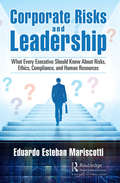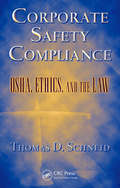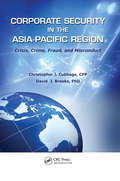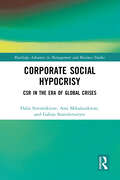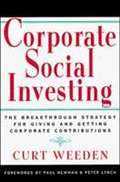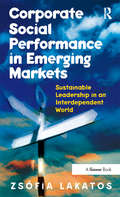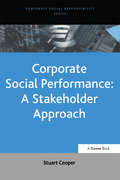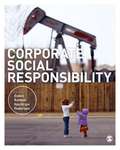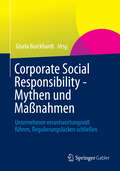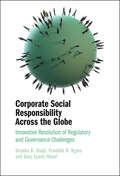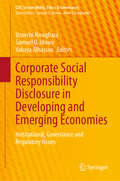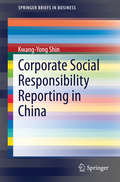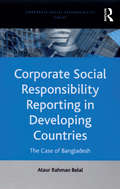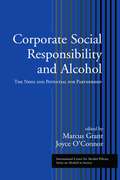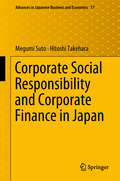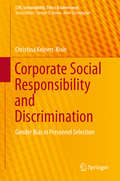- Table View
- List View
Corporate Risks and Leadership: What Every Executive Should Know About Risks, Ethics, Compliance, and Human Resources
by Eduardo Esteban MariscottiThe context of business has been changing for companies in recent years, and following numerous corporate and accounting scandals, many countries have increased the number of national and international regulations designed to ensure transparency and compliance with the law. Because of the existence of these new regulations, the level of control, the severity of sanctions by governments, and the amount of the fines for noncompliance have increased dramatically. In parallel, with the technological revolution in communications, business management has become more transparent, and any negative event is uploaded to social networks and shared with an indeterminate number of people. This change in the regulatory, sanctioning and technological context has forced large companies to rethink risks, investments and budgets to deal in this more complex environment. To transition to this change, some companies have included ethics and compliance programs in their corporate agenda, along with marketing and sales plans, strategies, growth targets, investment plans and/or talent acquisition. While each industry has its particular risks, in this book, the author describes the essential elements that any effective ethics and compliance program should contain. This book is a source of information that connects yesterday with today. The author shares observations and lessons of the past to suggest corporate leaders implement effective ethics and compliance programs to protect their organizations and themselves. The book covers theories of ethics but with an eye focused on practical application. Risks, ethics, and compliance are analyzed with an overall vision, connected to the reality of business life, without getting bogged down in abstract thinking or in technical and regulatory details. Ethics and compliance are disciplines that have increasingly achieved greater recognition in organizations. Thus, due to the importance of risk management in the business world and the necessary involvement of the CEO and the board of directors, it seems appropriate that executives get access to a book about risks, ethics, compliance and human resources directed not only to compliance experts but also to any organizational leader. This book is a wake-up call that allows business leaders to understand the benefits of implementing an effective ethics and compliance program that will help members of organizations to make the right decisions and act within the law. If they do, they can better prevent and react to the difficult obstacle course of risks, dangers and threats that organizations face and that may jeopardize the sustainability, resilience, and survival of companies.
Corporate Romanticism: Liberalism, Justice, and the Novel (Lit Z)
by Daniel M. StoutCorporate Romanticism offers an alternative history of the connections between modernity, individualism, and the novel. In early nineteenth-century England, two developments—the rise of corporate persons and the expanded scale of industrial action—undermined the basic assumption underpinning both liberalism and the law: that individual human persons can be meaningfully correlated with specific actions and particular effects. Reading works by Godwin, Austen, Hogg, Mary Shelley, and Dickens alongside a wide-ranging set of debates in nineteenth-century law and Romantic politics and aesthetics, Daniel Stout argues that the novel, a literary form long understood as a reflection of individualism’s ideological ascent, in fact registered the fragile fictionality of accountable individuals in a period defined by corporate actors and expansively entangled fields of action.Examining how liberalism, the law, and the novel all wrestled with the moral implications of a highly collectivized and densely packed modernity, Corporate Romanticism reconfigures our sense of the nineteenth century and its novels, arguing that we see in them not simply the apotheosis of laissez-fair individualism but the first chapter of a crucial and distinctly modern problem about how to fit the individualist and humanist terms of justice onto a world in which the most consequential agents are no longer persons.
Corporate Safety Compliance: OSHA, Ethics, and the Law (Occupational Safety & Health Guide Series)
by Thomas D. SchneidSafety and health professionals face a variety of potential legal and ethical issues. As a result of changing responsibilities and new laws, professionals often find themselves in situations without guidance toward the solutions. This book provides such guidance to legal issues involving OSHA and how to avoid potential legal areas of liability if possible. Tackling safety and ethical issues head on, the text explores the area of criminal liability for individuals and corporations under the OSHA Act and state criminal codes. The author also gives methods to achieve and to maintain OSHA compliance, using specific case studies to illustrate ways to avoid or to minimize the impact of legal issues.
Corporate Security in the Asia-Pacific Region: Crisis, Crime, Fraud, and Misconduct
by Christopher J. Cubbage CPP David J. Brooks PhDAs corporations and governments become more litigious and risk averse, international risk management becomes more complex. Corporate Security in the Asia-Pacific Region: Crisis, Crime, Fraud, and Misconduct examines real cases of corporate crisis, crime, fraud, and other misconduct that corporate security professionals need to be aware of to effect
Corporate Social Disclosure
by Carlos NoronhaCorporate Social Disclosure focuses on China and Japan as two countries for critical observations of the latest CSD issues. This volume consists of 12 chapters written by scholars from these two countries, addressing the latest observation of CSD in general as we as in different industries based on their latest research findings.
Corporate Social Entrepreneurship
by Christine A. HemingwayBusiness ethics teaching appears to have had little impact, particularly in the light of continued malpractice and misdemeanour in the form of financial scandals, environmental disasters and adverse consequences for communities. This timely book directly addresses a central question: is it that the existence of an ethical or an unethical climate influences behaviour, or, does the presence or absence of a moral character and personal values have the greatest influence on behaviour at work? Drawing on an empirically derived study and over thirty years of experience in both the public and private sectors, Hemingway proposes four modes of individual moral commitment to corporate social responsibility (CSR) and sustainability: the Active Corporate Social Entrepreneur, the Concealed Corporate Social Entrepreneur, the Conformist and the Disassociated. The discovery of the corporate social entrepreneur offers students and scholars a critical, alternative and optimistic perspective for the future of ethical business.
Corporate Social Hypocrisy: CSR in the Era of Global Crises (Routledge Advances in Management and Business Studies)
by Asta Mikalauskienė Dalia Steimikiene Gabija StanislovaitytėMany new challenges including competitiveness are emerging for sustainable business during this era of disruption. This book analyses these challenges to sustainable development and growth and addresses the impact of corporate social responsibility on the competitiveness of organisations. The authors analyze the major challenges for competitiveness of sustainable business in the COVID-19 era, taking into account a new business environment amid major global risks and uncertainties linked to climate change, pandemics, Russian-Ukrainian war, and intuitions of forthcoming new world economic crisis. The monograph consists of five parts: 1) sustainable development goals and the role of business; 2) climate change, COVID-19, fragile political situation, and business; 3) corporate social responsibility and corporate social hypocrisy; 4) corporate social responsibility, corporate social hypocrisy, and competitiveness of business; and 5) case study on the impact of corporate social responsibility on competitiveness with the impediments of corporate social hypocrisy. The book presents new insights in assessing the impact of CSR on competitiveness of companies with the impediments of corporate social hypocrisy. The developed framework and case study allows to develop valuable policy and managerial implications for sustainable business and engagements in corporate social responsibility as well as to show the danger of corporate social hypocrisy for competitiveness. This book will be of value to researchers, academics, and students in the fields of corporate social responsibility, organizational management, business ethics, and responsible business.
Corporate Social Investing: Breakthrough Strategy for Giving and Getting Corporate Contributions
by Curt WeedenThis is an advanced strategy for giving and getting corporate contributions with various depictions through calculations on the basis of situations from actual economical and statistical world.
Corporate Social Irresponsibility
by Paula AlexanderCorporate Social Irresponsibility focuses on ethical failures in order to relate corporate responsibility to business ethics, corporate governance, and organization effectiveness. The book advocates a strategic approach to CSR – ethical management cannot, and should not, be divorced from effective management. Corporate social responsibility has transitioned from oxymoron into a defining challenge of the twenty first century. Taking the recent financial crisis as a starting point, Alexander examines the underlying ethical and legal crises these events expose in the business world. The problems that have come to light go beyond issues of firm financial performance into the integrity of the manufacturing and marketing processes, and relations with consumers. As such, the book presents a model that resolves the apparent conflict between maximizing shareholder value, and meeting the interests of other firm stakeholders. Alexander presents a balanced view, contrasting her model with alternative approaches. The book also covers the impact of globalization on management, the ethics of outsourcing, the limits of regulation, as well as poverty alleviation and social entrepreneurship. Blending a comprehensive theoretical framework with a broad range of cases, this book covers the latest major changes in US legislation, as well as recent corporate scandals making it a valuable accompaniment to any course in CSR, business ethics, or business, government and society.
Corporate Social Opportunity!: Seven Steps to Make Corporate Social Responsibility Work for your Business
by David Grayson Adrian HodgesThis practical guide is designed to help business leaders and their managers understand how to assess the impact of corporate social responsibility factors on their core business strategy and operations, and help them identify and prioritize between subsequent options and resulting business opportunities
Corporate Social Performance in Emerging Markets: Sustainable Leadership in an Interdependent World
by Zsófia LakatosWhen it comes to perceptions of what is a sustainable economy and how it may be realised, companies expanding into Central and Eastern European markets face the challenge of diverse people, attitudes and history. Corporate Social Performance in Emerging Markets provides an effective tool for companies to help them engage in CSR activities and become a responsible company in CEE countries such as Poland, Hungary, the Czech Republic, Slovakia, Croatia and Slovenia. It does this by enabling them to focus on the difference of stakeholders and their attitudes to those of Western Europe. The author, Zsófia Lakatos, provides a review of the major differences between the various CEE countries, supported by interview research from leading executives in some of the blue-chip companies already operating in the region.
Corporate Social Performance: A Stakeholder Approach (Corporate Social Responsibility Series)
by Stuart CooperCorporate social performance has come of age. In a business environment characterized by its perpetual state of flux, the ability to recognize and react to global forces becomes paramount. The fallout of such rapid change - the fast-paced developments in communications and technology, the continual change to global markets, shifting demographics, the homogenization of personal values - have all contributed to the widespread new interest in issues such as ecology and environment, human rights and diversity, health and well-being, and communities. All of these issues are now potential liabilities for companies, and are very much back on the agenda for business. Once regarded as peripheral management concerns, they are now recognized as hard to predict and hard for business to deal with when they go wrong. This book offers an insight into how corporate social performance can be measured and why this is an important aspect of corporate social responsibility. Using detailed case studies, it provides readers with the foundations for understanding and applying corporate social performance, providing a stakeholder framework by which corporate social performance can be measured, alongside a detailed consideration of the value of different stakeholder measures. The book also applies this framework to new social accounting standards, enabling the reader to consider the validity and appropriateness of these standards. The increasingly important role of the internet for corporate social reporting is also considered.
Corporate Social Responsibility
by Mette Morsing Andreas Rasche Jeremy MoonAlthough the idea of social responsibility has a long and distinguished intellectual pedigree, Corporate Social Responsibility (or 'CSR') has re-emerged during the last fifteen years or so as a high-profile concept in both academia and business practice. This revitalized interest has come about largely because of the development of the 'markets for virtue' that have institutionalized CSR in business practices in an unprecedented manner. CSR has achieved organizational distinctiveness within companies (e. g. in managerial and board responsibilities); social and environmental reporting requirements have dramatically increased; socially responsible investment funds have not only established themselves in their own right, but have also informed more mainstream investment criteria, particularly regarding social and environmental risk; a CSR consultancy industry has emerged, along with various 'vanguard groups' and NGOs who seek not only to promote CSR, but also to bring critical perspectives to bear and to raise CSR standards; and governments around the globe have encouraged investment in CSR, better reporting of these activities, and the implementation of CSR initiatives that complement broader public policies. As research in and around CSR blossoms as never before, this new four-volume collection from Routledge's acclaimed Critical Perspectives on Business and Management series meets the need for an authoritative reference work to make sense of a rapidly growing and ever more complex corpus of literature. Edited by two scholars from Nottingham University's world-class International Centre for Corporate Social Responsibility, the collection gathers foundational and canonical work, together with innovative and cutting-edge applications and interventions. With a full index, together with a comprehensive introduction, newly written by the editors, which places the collected material in its historical and intellectual context, Corporate Social Responsibility is an essential work of reference. The collection will be particularly useful as an essential database allowing scattered and often fugitive material to be easily located. It will also be welcomed as a crucial tool permitting rapid access to less familiar--and sometimes overlooked--texts. For researchers, students, practitioners, and policy-makers, it is as a vital one-stop research and pedagogic resource.
Corporate Social Responsibility
by Esben Rahbek Pedersen*Shortlisted in the Management and Leadership Textbook Category at CMI Management Book of the Year Awards 2016* Instructors - Electronic inspection copies are available or contact your local sales representative for an inspection copy of the print version. Why has CSR become part of the mainstream business and academic agenda in the 21st century? How can CSR be fully integrated in business strategy and day-to-day operations? Do companies become more vulnerable to criticism from stakeholders if they make public their commitment to CSR? These are just some of the questions and challenges explored in this exciting new textbook. Readers will not only gain comprehensive knowledge and understanding of the history of CSR, the key CSR drivers, the main theoretical CSR perspectives and the dominant CSR practices found in the business community, they will also, more crucially, learn how to implement CSR in practice. Written and edited by leading academics in the field, Corporate Social Responsibility is an engaging and accessible text designed for any student seeking an introduction to this complex and ambiguous subject. Esben Pedersen is Professor at the CBS Center for Corporate Social Responsibility, Copenhagen Business School. Visit the Companion Website at (https://study.sagepub.com/pedersen) for annotated web links, free full-text journal articles and more.
Corporate Social Responsibility
by Esben Rahbek PedersenWhy has CSR become part of the mainstream business and academic agenda in the 21st century? How can CSR be fully integrated in business strategy and day-to-day operations? Do companies become more vulnerable to criticism from stakeholders if they make public their commitment to CSR? These are just some of the questions and challenges explored in this exciting new textbook. Readers will not only gain comprehensive knowledge and understanding of the history of CSR, the key CSR drivers, the main theoretical CSR perspectives and the dominant CSR practices found in the business community, they will also, more crucially, learn how to implement CSR in practice. Written and edited by leading academics in the field, Corporate Social Responsibility is an engaging and accessible text designed for any student seeking an introduction to this complex and ambiguous subject. Esben Pedersen is Professor at the CBS Center for Corporate Social Responsibility, Copenhagen Business School. Visit https://study.sagepub.com/pedersen for annotated web links, free full-text journal articles and more.
Corporate Social Responsibility - Mythen und Maßnahmen: Unternehmen verantwortungsvoll führen, Regulierungslücken schließen
by Gisela BurckhardtIn Zeiten der Globalisierung und Massenproduktion rückt verantwortungsvolle Unternehmensführung immer mehr in das Bewusstsein der Unternehmen. Damit Corporate Social Responsibility in Organisationen nicht als reine PR-Maßnahme angesehen wird, braucht es jedoch zunächst ein tiefes Verständnis, was sich hinter dem Begriff eigentlich verbirgt. Dieses Buch zeigt die Bandbreite von Unternehmensverantwortung zwischen Freiwilligkeit und Regulierung in globalen Lieferketten auf. Es stellt Maßnahmen und Initiativen von Unternehmen vor und gibt konkrete Empfehlungen, wie sinnvolle und nachhaltige CSR-Maßnahmen in Organisationen umgesetzt werden können.
Corporate Social Responsibility Across the Globe: Innovative Resolution of Regulatory and Governance Challenges
by Franklin N. Ngwu Onyeka K. Osuji Gary Lynch-WoodCorporate Social Responsibility Across the Globe demonstrates many ways that CSR can be applied by law to overcome regulation and governance challenges around the world. Using interdisciplinary and comparative models and perspectives, the book challenges dominant understandings of CSR, such as neoliberal voluntarism, and demonstrates the regulatory and governance implications of an interdependent relationship between CSR and the law. The book identifies substantive and procedural barriers for CSR in national, public, and private international law. By analyzing, deconstructing, and reframing CSR in these contexts, the book underlines opportunities for more effective application of CSR as a governance mechanism. Chapters investigate relevant regulation concepts, paradigms and approaches for CSR; methods for infusing CSR in corporate governance; and ways to facilitate private regulation of CSR in more developed, emerging, and developing jurisdictions.
Corporate Social Responsibility Disclosure in Developing and Emerging Economies: Institutional, Governance and Regulatory Issues (CSR, Sustainability, Ethics & Governance)
by Samuel O. Idowu Uzoechi Nwagbara Yahaya AlhassanThis book offers a new, nuanced, and comprehensive look at how CSR is practiced and disclosed in terms of corporate transparency, sustainability, and accountability, from the perspective of developing and emerging economies. Given the importance and power of emerging economies in shaping global gross domestic product (GDP), entrepreneurship, and corporate investment, it is crucial to examine this phenomenon in terms of corporate sustainability and achieving the ideals of the Sustainable Development Goals (SDGs) for a more sustainable future. The book therefore addresses contextual institutional, regulatory, and governance issues in these regions to contribute to the debate as well as a rethinking of the motivation for CSR practice and reporting. The book will be of interest to researchers, practitioners, and students.
Corporate Social Responsibility Reporting in China (SpringerBriefs in Business)
by Kwang-Yong ShinThe CSR report has become a very important tool which can help corporations to set up strategies and build their core competencies. This book presents a range of cases from different industries. Based on the analysis of the enterprise survival environment, it points out the necessity and significance of CSR. The book analyzes the current situation and development trend of CSR in China, as well as its international developing trend. By analyzing the management framework and formulation process of the CSR report, this book provides businesses with guiding principles for preparing the CSR report.
Corporate Social Responsibility Reporting in Developing Countries: The Case of Bangladesh (Corporate Social Responsibility Series)
by Ataur Rahman BelalHistorically, the study of corporate social responsibility (CSR) reporting has largely been within the context of Western economies. However, in the wake of highly publicized incidents such as Bhopal and the struggle of the Ogoni people in Nigeria, many large corporations now claim to be taking steps to improve their environmental and social performance within developing countries. Using the lens of stakeholder theory, this book examines whether the current practice of CSR reporting in developing countries is motivated by a desire to discharge accountability to all relevant stakeholders or whether it is being driven by the imperative of advancing corporate economic interests. While concepts like CSR reporting have become more fashionable, they vary widely in different national contexts; this book therefore clarifies the types and roles of CSR reporting and the underlying corporate motivations. The author considers the current CSR reporting practices in a number of developing countries, with particular attention given to illuminating a case study of Bangladesh.
Corporate Social Responsibility and Alcohol: The Need and Potential for Partnership (ICAP Series on Alcohol in Society)
by Marcus Grant Joyce O'ConnorIncreased scrutiny on the part of the general public, media, and government has warranted a reexamination of corporate responsibilities, standards of accountability, the company's role in its local and extended community, and its ethical position in our society and culture. Corporate Social Responsibility and Alcohol considers the basic values, ethics, policies and practices of a company's business. Particular attention will be paid to the alcohol beverage industry, and the many unique issues that are specific to this business, such as: responsible marketing, promotional, and advertising campaigns and strategies; the particular risks inherent in any alcoholic product; issues of abuse prevention & education; research; and legal and ethical aspects of alcohol. This will be the seventh volume in the ICAP Series on Alcohol in Society.
Corporate Social Responsibility and Corporate Change: Institutional and Organizational Perspectives (Ethical Economy #57)
by Arnaud SalesThis wide-ranging book examines the new dynamics of corporate social responsibility (CSR) and the impact they have had on the transformation of business corporations. Written by an international group of distinguished experts in management and organization studies, economics and sociology, the book leads one to theoretically and practically rethink CSR, a movement that has developed into a strong and rich institutional domain since the mid 1990s. Through 14 chapters, the book shows the complexity, diversity and progression of the institutional work performed by a large number of individual and organizational actors in specialized networks to develop this strategic field. Central to this book are: the core issues associated with the field of CSR; recent advances in the development, dissemination and implementation of public and private standards of social responsibility; the pressing challenges of developing sustainable strategies of value creation in the face of global warming and underdevelopment; and finally, examples of how CSR has been implemented and institutionalized within business organizations with special attention to the role played by a variety of social actors in organizational change. Conceived as a movement, corporate social responsibility spearheads a transformation project challenging traditional and outmoded forms of corporate governance that frequently pose troublesome ethical issues. From this standpoint, Corporate Social Responsibility and Corporate Change will serve as a reference point for academics, researchers, managers and practitioners.
Corporate Social Responsibility and Corporate Finance in Japan (Advances in Japanese Business and Economics #17)
by Hitoshi Takehara Megumi SutoThis book explores the linkages between the evolution of corporate social responsibility (CSR) and corporate financing and governance in Japan since the late 2000s. Since the 1990s, increasing economic and financial globalization has steadily eroded the Japanese style of business based on relationships and influenced the awareness and practices of CSR that are unique to Japanese companies. In Japan’s two “lost decades” after the bubble economy, the business model and corporate financing seem to have continued a gradual financial reform toward a more market-oriented system. CSR awareness and practices of Japanese companies have been influenced by social and environmental issues that global society and communities face. Furthermore, the Fukushima nuclear accident in 2011 triggered increasing attention paid to the responsibility of business toward society. In this process, major players in corporate governance and components of governance structure have continued to change. The conventional view of Japanese corporate governance and corporate finance is too narrow to understand this field in Japan. This book is based on empirical research to investigate how multifaceted CSR has aligned with business and finance and has influenced the corporate governance structure of Japanese companies. The findings and discussions in this book act are stepping stones in further research on the linkages between business and society, and provide empirical evidence on changes in Japanese corporate finance and governance.
Corporate Social Responsibility and Corporate Governance
by Lorenzo SacconiCorporate social responsibility (CSR) is fast becoming a social demand and standard of behaviour in terms of the equitable treatment of corporate stakeholders to which all businesses feel they are expected to conform. Increasingly governance of corporations is viewed as accountable not just to shareholders but to multiple stakeholders, requiring an extension of the firm's fiduciary duties. Such ideas are even more topical after the last global financial crisis. This volume addresses the question: what does the rise of corporate social responsibility mean for economic theory? It considers, in particular, microeconomic theory and the theory of the firm alongside new-institutional and behavioural theories, game theory, stakeholder theory, incomplete contracts and law and economics. Drawing on the contributions of outstanding scholars like the Nobel laureate Oliver Williamson among others, it is shown that corporate social responsibility forces the economic theorist to engage with ideas emanating from other disciplines, including ethics, political philosophy and the law. The result is a set of essays that is perhaps more interdisciplinary than is usual for books on economic theory. This volume looks certain to establish itself as an invaluable text for scholars of economic theory, as well as their students in both advanced undergraduate and postgraduate courses. Part I explores the relation of CSR, offering different perspectives on the nature of the business firm and its governance structure based on human asset specificity, team production and the stakeholder approach (O. Williamson; M. Aoki;R. E. Freeman; A. Wicks and B. Parmar; A. Kaufman and E. Englander; and L. Stout and M. Blair). Part II considers alternative normative foundations of CSR and corporate governance based on models of the social contract, reputation effects, and collective rational agency (V. Vamberg; L. Sacconi; L. Andreozzi; and B. Chapman). Part III illustrates various approaches to the regulation and self-regulations of CSR, with special emphasis on social standards and multi-stakeholder organisations analysed alongside the more recent acquisition in behavioural economics (M. Blair, C. Williams and L. Lin; L. Becchetti and N. Pace; M. Osterloh, B. Frey and H. Zeitoun; A. Ben Ner, T. Ren and L. Putterman). "
Corporate Social Responsibility and Discrimination: Gender Bias in Personnel Selection (CSR, Sustainability, Ethics & Governance #0)
by Christina Keinert-KisinThisbook presents and deconstructs the existing explanations for the differentialcareer development of qualified men and women. It reframes the problem ofdiscrimination in the workplace as a matter of organizational ethics, socialresponsibility and compliance with existing equal opportunity laws. Sensitivepoints are identified where social biases, decision-makers' individual economicinterests and shortcomings of organizational incentive policies may lead todiscrimination against qualified women. The ideas put forward are empiricallytested in an original laboratory experiment that examines personnel selectionin the male-dominated field of science and technology. It contrasts theselection of applicants with gendered and gender-blind applications availableto subjects under controlled conditions. 30% of participants were high-leveldecision-makers, which is unprecedented in this field of research. The results,highly relevant for organizational practice, are explained and discussed indetail.
